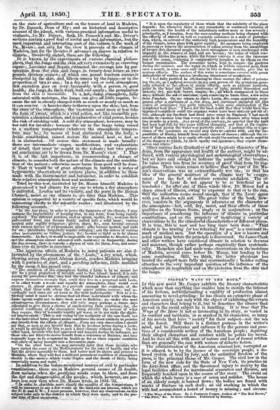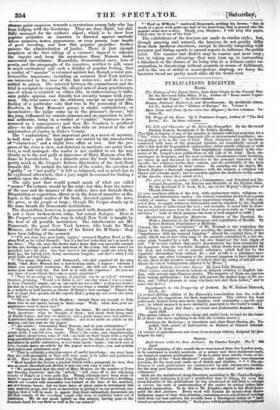'S WAYS OF THE H017R. * peT ,, 9thibits the literary characteristic fhioli
mg? else efiiihis him to sustain theinferest
Of his fic on,s, no ding a rapidity of production almost
amounting t,,o novlgrhiding : he has ch4.en an extensive phase of .A.meriean society, 0,14 only with the obeet'itbibiting the events and charlders thabelupg to t, butto denoiftinethe' abuses that 1t\alr4Bti soci4 tbtlW ia handling:'" true that The .„ api,o):1114..„7-kier.41.,4 not so interesting in its stir, so varied in tiondnet ad incidents, or so marked julie characters, as may oais novels that have .‘,‘ society " for their subject—not the sea Or the forest. Still there is a distinct purpose in the writer's mind, and lie i1lustr40, and enforces it by the persons and Fie-, ticAs of a consigerable'S4tion, of the American people; depleting .rIiq while he points his moral. 1:he -does All' this with 'Lore- hr nature and less of formal artifice are generally the case with writers of didactic fiction. adMinistration of the American criminal law, corrupted as tf.is Asgoilf to be by the licence of the sovereign people, a de. .4nsp4 sSutem of trial by juit'y,'and_tha:L-nnlimited freedom of the Preis," is the principal theme of Mr: CaoPer. The civil law in thoi form of the new code for the State of New York, its practice in the Anti-Rent affair, and the threatened injury to society by the legal facilities offerOd-cor::inatrimonial separation and divorce, are frecjuently touched:49n in the course of the story. - The event on which the whole turns is a case of arson and miirder. The house of an elderly couple, is. binned down ; the bodies are found with "Marks of fracture "id eadll skull; an old stocking in which the Wife had accumulated a hoard of money is missing ; and circum- * The Ways of the Hour. By J. Fenimore Cooper, Author of The Red Itover,
The Pilot," &c. In three volumes. Published by Bentley.
- -
jrN this new: uswel The only part that would permit much of what are 'called "scenes "for extract, would be the trial; but this, from the nature tif the ease and the manner of the author, does not furnish them. Disquisition or exposition, direct or in the form of narrative or din- rove, is the staple matter of the book, (Erected against the laws, the press' or the people at large ; though Mr. Cooper stands up in the same breath for Democratic institutions.
The disquisition, however, is presented with dramatic spirit ; it Is not a mere broken-down essay, but actual dialogue. Here is Mr. Cooper's account of the way in which New York is taught by the best of all possible instructors. The interlocutors are Mr. Dunsannb, the great New York lawyer, who leads for Mary Monson, and the old coachman of his friend Dr. M93rain : they have been alking of the accused. - " -rn not deny her good looks, 'squire,' returned- Stephen Roof, or Ste- phen Huff, as he called' himself; but it's herbad.looks that isn't so much to my fancy. Thy, sir, once the doctor had a horse that was agreeable enough, te the eye, having a good colour and most of the p'ints; but whe wasn't no traveller, not a bit met One that know'd the animal could see where the fault lay, the fetlock j'int being oncommon longish ; and that's what I call good looks and bad looks.' 'You mean Stephen,' said Dunscomb, who had regained- an his sang *aid, 'that hazy Monson has a bad-looking ankle, I suppose : wherein I think you miserably mistaken. No matter • she will not have to travel under your lash very far. But how is it with the reporters? ..Do you see any more of your friend that asks so many questions ? " They be an axing set, 'squire, if anybody can be so called,' returned Stephen, grinning. Would you think it, sir? one, day when I was a comin' in from Tirabully-erapty, one. on 'on axed me fora-ridel a chap has hadn't ids foot in a reelox private coach elute he was born, a 'Austin' to drive about m. a wehicle as well as Doctor M'Brain's best carriage ! Them's the sort of chaps that spreads all the reports that's going-up and down the land, they tell me.'
- " 'They do their share of it, Stephen ; though there are enough to help them who do not openly belong to their corps Well; what does your ac- quaintance want to kuow now ? '
" Oncommon curious, 'squire, about the hones. He axed me more than forty questions : what we thought of them ; and about their being male or female bones; and how we know'd and a great many more etch matters. I answered him aceordin' to my abilities ; and so he made an article on the subject, and has sent me the papers.'
"'An article! Concerning Mary Monson, and on year information?'
" 'Sartain, sir; and the bones. Vhy, they out articles out of much nar- rower cloth, I oan tell you, 'squire. There's the cooks, and chambermaids, and vaiters about town, none of vich can hold up their heads with a reglar leng-established physician's coachman, who goes far ahead of even an omni- bus-driver in public estimation, as you must know, 'squire ; bat such sort of folks furnish many an article for the papers now-asdays; yes and articles that ladies Auld gentlemen read.'
That is certainly a singular source of useful knowledge : one must hope are well-grounded, or they will soon cease to be ladies and gentlemen at I. Have you the paper about you, Stephen ? '
"Hoof handed the lawyer a journal folded with a paragraph in view, that was so much thumbed and dirtied it was not very easy to read it "'We understand that the trial of Mary Monson, for the murder of Peter and Dorothy Goodwin,' said the articls" will come off in the adjoining County of Duke's at a very early day. Strong attempts have been made to make it appear that the skeletons found in the rains of Goodwin's dwelling, thighi our readers will remember was burned at the time of the murders, Mad human been; but we have been, at great pains to investigate this miry material point, and have no hesitation in giving it as our profound con- viction that it will be made to appear that these melancholy memorials are tin that remain of the excellent couple who were so suddenly taken out of eniatence. We do not speak lightly on this subject, having gone to the fountain-head for our facts as well as for our science.' Stances point suspicion towards a nysterinns young lady who has been lo ding with the Goodwins. They are very slight, but skil- fully managed for the author's object; which is to show how popular prejudice in America is directed against anybody whose manners, tastes, appearance, or even person, bear marks of good breeding, and how this popular prejudice further poisons the administration of justice. There is just enough suspicion at the first sitting of a coroner's inquest to adjourn the inquiry and keep the mysterious Mary Monson under unavowed surveillance. Meanwhile, Demoeratical envy, love of gossips and the paragraphs of the reporters, written to sell, cause so much excitement and such a display of popular feeling, that v. verdict of" murder" is returned against her, though several gen- tlemanlike Americans, including an eminent New York lawyer, are interested in the case of the fair unknown ; and she is com- mitted to prison. The interval between the commitment and the trial is occupied. in exposing the alleged arts of sharp practitioners, ono of whom is retained on either side, in endeavouring to influ- ence public opinion, and directly but covertly tamper with jury- men. The trial eomes ; the evidence, except on one point (the finding. or a particular coin that was in the possession of ME. Goodwm in Mary Munson's purse) is slight, contradictory, or inconclusive ; the judge sums up in the prisoner's favour; hut Nut jury, influenced by outside rumours and an. opposition to judi- cial authority, bring in a verdict of "guilty" Sentence is pro- nomiced as a consequence; and then Mr. Goodwin is produced tdive--to. the edification of those who take an interest in the ad- Ministration of justice in Duke's County. - The "explanation," that important part in a novel of mystery, is well dune; and the legal parts are varied by the introduction of "characters," and a slight love- affair or two. But the pro- gress of the story is slow, and deficient in incident: one point, how- ever, is well managed—the reader is uot enabled to see his way dearly as to the real guilt or innocence of Mary Monson alias Ma- dame de Larocheforte. In a didactic sense the book breaks down pretty ranch as Mr. Cooper's fictions illustrative of the Anti-Bent crusade did. To sustain the interest of the reader, the question of "-guilty" or "not guilty" is left se balanced, and so mu& has to te explained afterwards, that a jury might be excused for finding a ;verdict upon the evidence. "'Roof on Mitrain !' muttered Dtmscomb, arching his brows • this is much of a piece with quite one-half of the knowledge that is poured into the popular mind now-a-days. Thank, you, Stephen ; I will keep this paper, which may be of use at the trial.' ' The exbibitions of the lawyers are made in similar style; but, though amusing and. natural, the lawyers do not greatly differ from their brethren elsewhere, except in directly tampering with jurymen and hiring agents to spread reports to influence the public mind. The manner and dialect may be coarser and more racy; but in taking any advantage that may turn up, in insinuating a falsehood on the chance of its being true to a witness under ex- amination, in threatening without grounds or means of fulfilment, mut in the use of artful or unscrupulous claptrap, we fancy the barrister brood are pretty much alike all the world. over.



























 Previous page
Previous page